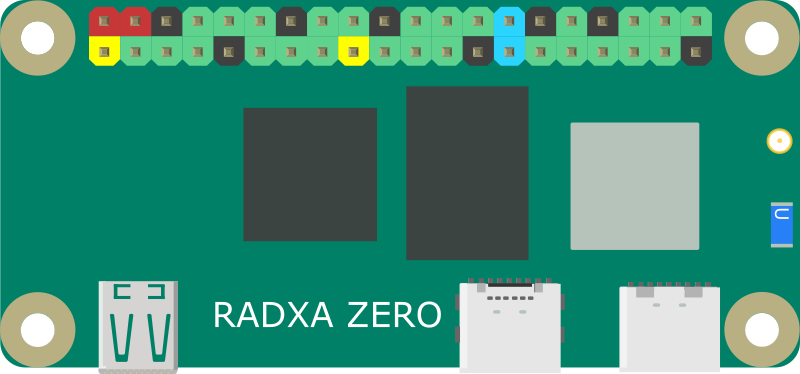Difference between revisions of "Zero"
RadxaYuntian (Talk | contribs) |
|||
| (33 intermediate revisions by 6 users not shown) | |||
| Line 1: | Line 1: | ||
| − | == Radxa Zero | + | {{Zero_header}} |
| + | {{Languages|zero}} | ||
| + | |||
| + | __NOTOC__ | ||
| + | |||
| + | <div class="col-md-12 "> | ||
| + | <div class="col-md-8 "> | ||
| + | = Radxa Zero= | ||
[[File:Zero-800px.png]] | [[File:Zero-800px.png]] | ||
| − | Radxa Zero | + | This is the Wiki page for Radxa Zero, written by Radxa Team with community contributions. |
| − | + | Radxa Zero is an ultra thin SBC in small form factor with powerful performance based on Amlogic S905Y2. It can run Android and selected Linux distributions. | |
| − | + | Radxa Zero features a quad core 64-bit ARM processor, up to 4GB 32bit LPDDR4 memory, HDMI output at 4K@60, WiFi and BT connectivity, USB 3.0, and 40-pin GPIO header. Additionally, the power port can also be used for USB 2.0 OTG to connect more peripheral. | |
| − | + | ||
| − | + | Radxa Zero comes in multiple configurations to suit your need. Please check [[zero/hardware/models | Models & SKU]] for detail. | |
| − | + | ||
| − | + | </div> <!-- col-md-8 --> | |
| − | + | ||
| − | + | <div class="col-md-4 "> | |
| − | + | <div class="panel panel-mango-white"> | |
| − | + | <div class="panel-heading"> <h3 class="panel-title"><i class="fa fa-star"></i> [[community_updates | What's new]]</h3> </div> | |
| − | + | <div class="panel-body"> | |
| − | + | ||
| − | + | {{Community_updates}} | |
| + | |||
| + | |||
| + | </div> <!-- panel-body --> | ||
| + | </div> <!-- panel panel-mango-white --> | ||
| + | </div> <!-- col-md-4 --> | ||
| + | |||
| + | </div> <!-- col-md-12 --> | ||
<div class="col-md-12 "> | <div class="col-md-12 "> | ||
| + | |||
<div class="col-md-4"> | <div class="col-md-4"> | ||
<div class="panel panel-hearts-white"> | <div class="panel panel-hearts-white"> | ||
<div class="panel-heading"> <h3 class="panel-title"><i class="fa fa-hand-o-up"></i> [[Zero/getting_started | Setup/Quick start ]]</h3> </div> | <div class="panel-heading"> <h3 class="panel-title"><i class="fa fa-hand-o-up"></i> [[Zero/getting_started | Setup/Quick start ]]</h3> </div> | ||
<div class="panel-body"> | <div class="panel-body"> | ||
| − | + | * [[zero/getting_started | Getting started with your Radxa Zero]], including what you need and how to get it booted. | |
| + | * [[zero/hardware/gpio| GPIO pinout]] | ||
</div> | </div> | ||
</div> | </div> | ||
| − | </div> | + | </div> <!-- col-md-4 --> |
<div class="col-md-4 "> | <div class="col-md-4 "> | ||
| Line 34: | Line 50: | ||
<div class="panel-heading"><h3 class="panel-title"><i class="fa fa-download"></i> [[zero/install | Installation]]</h3></div> | <div class="panel-heading"><h3 class="panel-title"><i class="fa fa-download"></i> [[zero/install | Installation]]</h3></div> | ||
<div class="panel-body"> | <div class="panel-body"> | ||
| − | |||
| − | + | Installing an operating system on your Zero. Linux can boot from [[Zero/getting_started#Write_Image | micro SD]] or eMMC module. Android can only be installed on eMMC. | |
| + | * [[zero/install/eMMC_erase | Erase eMMC]] | ||
| + | * [[Zero/install/eMMC | Install Linux to eMMC]] | ||
| + | * [[Zero/install_eMMC_Android | Install Android to eMMC]] | ||
| + | * [[Zero/install/Boot_Troubleshooting | Boot Troubleshooting]] | ||
| + | |||
| + | </div> <!-- panel-body --> | ||
| + | </div> <!-- panel panel-mango-white --> | ||
| + | </div> <!-- col-md-4 --> | ||
| + | |||
| + | <div class="col-md-4"> | ||
| + | <div class="panel panel-mango-white"> | ||
| + | <div class="panel-heading"><h3 class="panel-title"><i class="fa fa-cog"></i> [[zero/dev | Development]]</h3></div> | ||
| + | <div class="panel-body"> | ||
| + | |||
| + | * [https://github.com/radxa/debos-radxa debos-radxa] build Radxa official system images | ||
| + | * [[zero/dev/serial-console | Attach to serial console]] | ||
| + | * [[zero/dev/adb | Enable adb service in Linux]] | ||
| + | * [[zero/dev/usb-mass-storage | Enable USB Mass Storage gadget in Linux]] | ||
| + | * [[zero/dev/u-boot | Build U-Boot]] | ||
| + | * [[zero/dev/kernel| Build kernel]] | ||
| + | * [[zero/dev/libmraa | Install Libmraa]] to enable GPIO access and more | ||
| + | |||
| + | [[zero/dev | > More...]] | ||
| + | </div> | ||
| + | </div> | ||
| + | </div> <!-- col-md-4 --> | ||
| + | |||
| + | </div> <!-- col-md-12 --> | ||
| + | |||
| + | <div class="col-md-12 "> | ||
| + | <div class="col-md-4 "> | ||
| + | <div class="panel panel-cello-white"> | ||
| + | <div class="panel-heading"><h3 class="panel-title"><i class="fa fa-hdd-o"></i> [[zero/hardware | Hardware]] </h3></div> | ||
| + | <div class="panel-body"> | ||
| + | |||
| + | Technical specifications about the Radxa Zero hardware, including components datasheet, schematic, etc. | ||
| + | |||
| + | * [[zero/hardware/zero | Main board]] - Hardware introduction of the Radxa Zero | ||
| + | * [https://dl.radxa.com/zero/docs/hw/S905Y2%20Quick%20Reference%20Manual%20v0.7.pdf S905Y2 Quick Reference Manual] - The SoC datasheet of Radxa Zero | ||
| + | * [[zero/hardware/models | Models and SKU]] | ||
| + | * [[zero/hardware/display | Display]] | ||
| + | * [[zero/hardware/camera/ | Camera module]] | ||
| + | * [[Device-tree-overlays | Device Tree Overlays]] | ||
| + | |||
| + | [[zero/hardware | > More...]] | ||
| + | |||
| + | </div> <!-- panel-body --> | ||
| + | </div> <!-- panel panel-mango-white --> | ||
| + | </div> <!-- col-md-4 --> | ||
| + | |||
| + | <div class="col-md-4 "> | ||
| + | <div class="panel panel-gunmetal-white"> | ||
| + | <div class="panel-heading"><h3 class="panel-title"><i class="fa fa-linux"></i> [[zero/Linux | Working With Linux ]]</h3></div> | ||
| + | <div class="panel-body"> | ||
| + | Fundamental Linux usage for beginners and advanced use cases for power users. | ||
| + | |||
| + | * [[zero/Debian | Debian]] | ||
| + | * [[zero/Ubuntu | Ubuntu]] | ||
| + | * [[zero/radxa-apt | Radxa APT repository]] | ||
| + | * [[zero/downloads | Download images]] | ||
| + | * [[Zero/Linux/usbnet | Enable USB Ethernet gadget]] | ||
| + | </div> <!-- panel-body --> | ||
| + | </div> <!-- panel panel-mango-white --> | ||
| + | </div> <!-- col-md-4 --> | ||
| + | |||
| + | <div class="col-md-4"> | ||
| + | <div class="panel panel-meadow-white"> | ||
| + | <div class="panel-heading"> <h3 class="panel-title"><i class="fa fa-android"></i> [[zero/Android | Working With Android ]]</h3></div> | ||
| + | <div class="panel-body"> | ||
| + | Fundamental Android usage for beginners and more advanced information for power users. | ||
| + | * [[Zero/Android9 | Android9]] | ||
| + | |||
| + | </div> | ||
| + | </div> | ||
| + | </div><!-- col-md-4 --> | ||
| + | |||
| + | <div class="col-md-4 "> | ||
| + | <div class="panel panel-cocktail-white"> | ||
| + | <div class="panel-heading"><h3 class="panel-title"><i class="fa fa-users"></i> Community</h3></div> | ||
| + | <div class="panel-body"> | ||
| + | * Forum: https://forum.radxa.com/c/zero | ||
| + | * Discord: https://rock.sh/go | ||
| + | * Wechat group: [[File:Wezero.jpg | 120px]] | ||
</div> | </div> | ||
</div> | </div> | ||
</div> | </div> | ||
Latest revision as of 13:20, 26 October 2022
Radxa Zero
This is the Wiki page for Radxa Zero, written by Radxa Team with community contributions.
Radxa Zero is an ultra thin SBC in small form factor with powerful performance based on Amlogic S905Y2. It can run Android and selected Linux distributions.
Radxa Zero features a quad core 64-bit ARM processor, up to 4GB 32bit LPDDR4 memory, HDMI output at 4K@60, WiFi and BT connectivity, USB 3.0, and 40-pin GPIO header. Additionally, the power port can also be used for USB 2.0 OTG to connect more peripheral.
Radxa Zero comes in multiple configurations to suit your need. Please check Models & SKU for detail.
- 2022-07-08: OpenSUSE now supports Radxa Zero, installation tutorials from OpenSUSE Wiki.
- 2022-06-23: ROCK 5B Developer Edition is shipping, checkout the Debug Party
- 2022-01-09: ROCK 5 Model B is announced: an ARM64 desktop level SBC
- 2021-10-11: Radxa Zero Debian/Ubuntu system images are released. Check the Radxa Zero Downloads.
- 2021-08-25: ROCK 3A Debian/Ubuntu system images are released. Check the ROCK 3 Downloads.
- 2021-07-11: IOhub is even more affordable with ROCK PI X hardware
- 2021-06-16: Radxa Zero is released
- 2021-04-15: ROCK PI S Based GPS NTP appliance is launched
- 2021-03-13: Build a Mini Serene Screen Aquarium with ROCK Pi X
- 2021-03-11: ROCK Pi 4 as the perfect Chia coin crypto currency farmer
- Getting started with your Radxa Zero, including what you need and how to get it booted.
- GPIO pinout
Installing an operating system on your Zero. Linux can boot from micro SD or eMMC module. Android can only be installed on eMMC.
- debos-radxa build Radxa official system images
- Attach to serial console
- Enable adb service in Linux
- Enable USB Mass Storage gadget in Linux
- Build U-Boot
- Build kernel
- Install Libmraa to enable GPIO access and more
Technical specifications about the Radxa Zero hardware, including components datasheet, schematic, etc.
- Main board - Hardware introduction of the Radxa Zero
- S905Y2 Quick Reference Manual - The SoC datasheet of Radxa Zero
- Models and SKU
- Display
- Camera module
- Device Tree Overlays
Fundamental Android usage for beginners and more advanced information for power users.
Community
- Forum: https://forum.radxa.com/c/zero
- Discord: https://rock.sh/go
- Wechat group:


